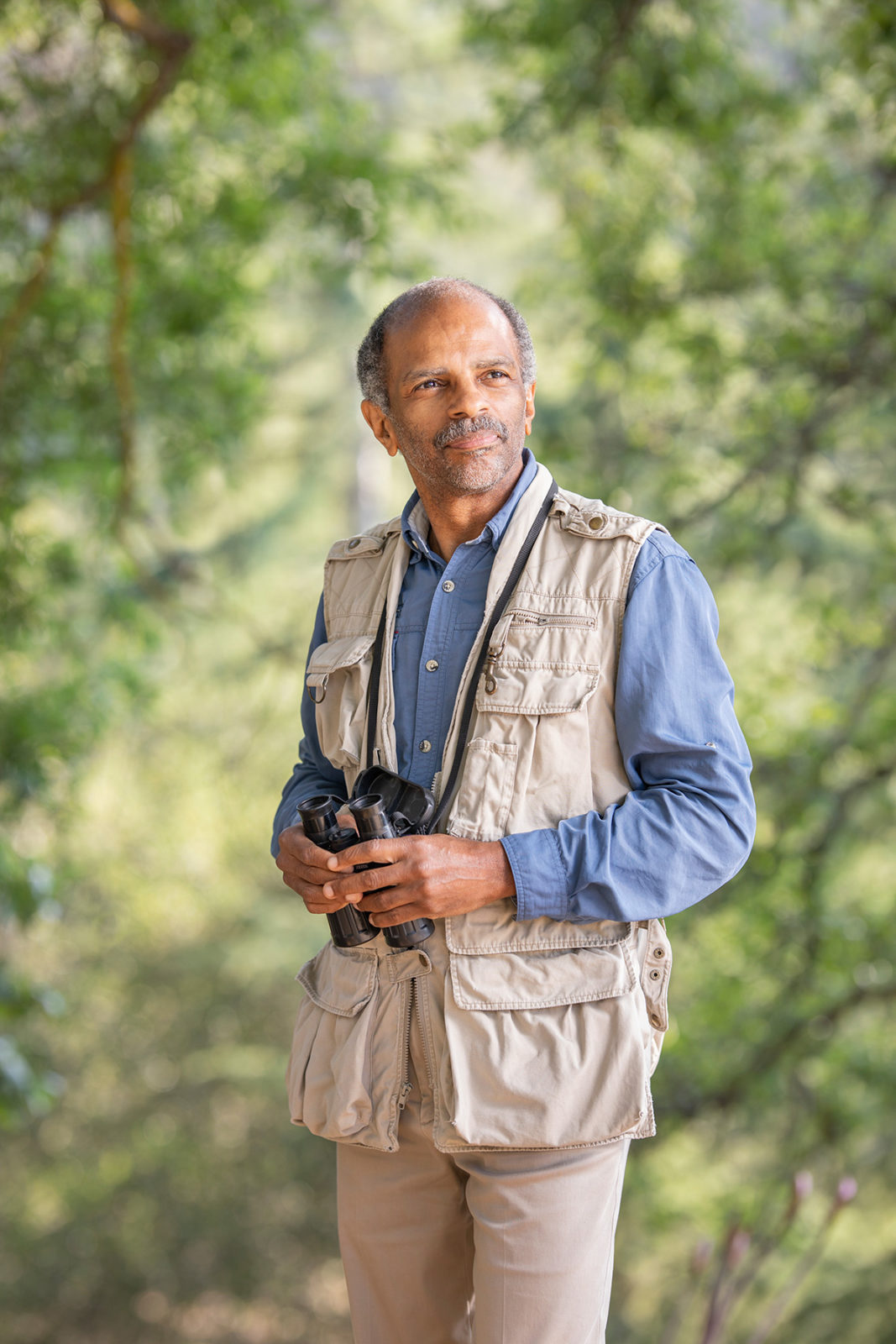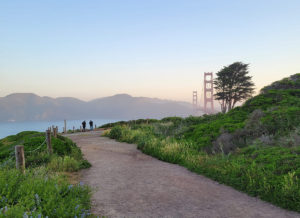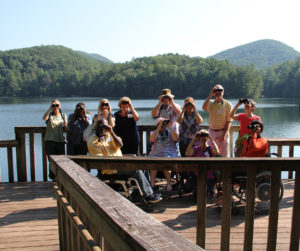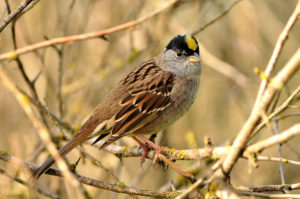
John Robinson isn’t a typical birder, as Bay Nature writer Jeremy Miller found last year while following Robinson on birding trips. He’s got 20/15 vision, for one. Perfect auditory recall, for another. He’s also black in a world that’s almost exclusively white. We caught up with Robinson by phone this week to see what he thought about our national conversation about race, access to nature, and birding, galvanized by a racist incident in New York’s Central Park and the killing of George Floyd.
Are you on social media? What do you make of the #BlackBirdersWeek that’s happening now?
I have social media accounts, but I don’t routinely get involved with it. There’s only so much time in the day!
I’m sure you’ve seen the story from Central Park of the white woman calling the police to threaten a black birder who asked her to leash her off-leash dog. What did you think when you saw that video?
My initial reaction was to recall my own experience of birding in Central Park sometime in the mid 1980s. It was my first visit to New York, and while there I had heard about a tufted duck (a rare bird from Europe and Asia) that had recently been seen occasionally on one of the ponds or lakes in the park. On my second day in the city, I visited the park but had trouble finding the lake in question because I did not have a map of the area. On the trail in front of me, there was only one other person – a Caucasian woman – who was approaching me. As our paths crossed, I stopped to speak to her and ask if she knew where the lake was. Her initial reaction was one of intense startlement, and it was clearly evident she did not feel comfortable talking to me alone in Central Park. When I repeated the question, she pointed in a direction over a slight hill and then hurried off.
This encounter affected me for many years. I felt hurt that she felt so uncomfortable around me. It was such a simple question, and yet I had never had anyone react so strongly to such a simple, innocent question. So … when I read Christian Cooper’s story, I could totally relate. He had simply asked her to leash her dog. The primary difference between his story and mine is that my experience took place in the 1980s and so there were no cell phones in existence.
It’s frustrating I have no way to instantly deliver that message to a person I meet for the very first time. I know that more times than not my outward appearance (and I’m not referring to the clothes I wear) cause me to be judged in a negative way by factors other than my own merits and accomplishments.
But the bigger message for me is that I still feel the same today about that encounter as when it actually happened over 30 years ago: I wish there could have been a way I could have instantly made the woman I encountered know all about me, my passion for birds, my respect for others, and the kindness I try to leave with each person I meet. It’s frustrating I have no way to instantly deliver that message to a person I meet for the very first time. I know that more times than not my outward appearance (and I’m not referring to the clothes I wear) cause me to be judged in a negative way by factors other than my own merits and accomplishments.
That being said, I think that the events surrounding Christian Cooper’s story represent a situation that could have happened in any state in the United States. To any person or persons, regardless of color. Specifically where I’m going with that, birdwatchers are particularly tuned into the environment. One of the things you get by being a birdwatcher, you also understand the habitat that they need. You’re very sensitive to doing what you can to help prevent any further loss of habitat. When you have a place like that, the Ramble, in the middle of a concrete jungle, this is like one of the last places where there is a very limited amount of habitat left. So anybody who goes birdwatching there knows whatever we can do to preserve that would be good for birds, but also people who come through and recreate. If you take race out of the equation for just a moment, any birdwatcher would have called out another person whose dog was off the leash and running through the Ramble. Because that dog has potential to do damage. Especially if there’s a sign there. All the more reason we would call that out and say, put that dog on a leash.
There are a number of people writing now about how they’ve never met another black birder, or always felt like they were the only one. You’ve said that, especially early in your career, you felt like you needed permission to go birding. That you hid your binoculars, didn’t want people to see what you were up to. Has that changed over the years?
Yes it has. It definitely has. I was feeling like I needed permission to go birdwatching. I didn’t want people to see me carrying around a pair of binoculars. I was almost afraid what they’d think of me. That need to have permission was magnified by the fact that when I’d go out, I wouldn’t see anyone else who looked like me out birdwatching. It was like this self-feeding loop: “If there’s no one who looks like me, I need to ask.”
Unfortunately a lot of people of color trying to get into this don’t have that type of experience to draw on. That’s why this message, young people of color, they feel like they need permission to go out.
In 1983 in Beckley, West Virginia, I finally realized that I do have something of value to bring to the birdwatchers world. From that point on the need to be so self-conscious, so quiet, try not to be observed, that began to drop away. It took that significant emotional experience. I recount that in my book, it took that to allow me to change my perspective. Unfortunately a lot of people of color trying to get into this don’t have that type of experience to draw on. That’s why this message, young people of color, they feel like they need permission to go out.
When I still was working with the U.S. Forest Service, before I retired, our building was in downtown San Francisco. We were doing a tree planting project over in Oakland. While we were out there planting trees we got to meet some of the students. I’m talking to a 16 year old girl in Oakland, California, and part of talking with her, I realize, she’s never been to the ocean. She’s never seen it. She lives less than 40 minutes away, 16 years of her life, she’s never been there. I could tell from my conversation with her that she was interested in visiting the ocean but frustrated by not knowing how to bring that into reality. The opportunities just aren’t there for many inner city people to go out and see that.
Many of the people organizing and posting about Black Birders Week are young graduate students. What advice would you have for them as someone who’s been birding for decades?
I think if you go back to my book, Birding for Everyone, go to page 55, you’ll see we disclose the results of a survey that we did with African American birdwatchers and non birdwatchers. One of the things we asked African-Americans who identified themselves as someone who watches birds was, “What are the reasons that keep you from birding as often as you would like?” Twenty-three percent said, “I’m uncomfortable because sometimes I feel afraid in forests or other natural settings.” Five percent said, “I don’t feel safe because of race and ethnicity.” We haven’t quantified it much further than that, but certainly there is some level of perceived fear or danger. We can’t ignore it.
But what I would say, all the years of my experience, if you’re a young person who enjoys the outdoors, enjoys studying nature, and would like to do that, just do it. The benefits, the real benefits of being outdoors, of studying nature, it’s all about health and wellness. It improves your physical and emotional well-being and changes how you look at the earth. It changes everything. It changes how you’re going to vote. You know?
So I would say just do it. The benefits far outweigh any danger that might be out there. Everything we do has a tiny bit of danger with it. Doing this for over 40 years, I can say without a doubt, without hesitation, although I know that danger is out there, and know it’s real, it’s so infinitesimally small that the benefits you’ll get far outweigh what’s out there. Don’t be afraid, just do it. The more you do it, your comfort level will rise, and the more relaxed you’ll feel.
You’ve talked about trying to get young people of color into birding by offering them the opportunity of mentorship. Where do you see the opportunities today, and what work remains to be done?
A lot of that I think we talked about in the book, and in speeches that I gave over the years going to various places. We don’t have enough role models, we don’t have enough mentors. I think we’re starting to see some improvement, but it’s certainly not enough. Whenever you pick up a magazine, watch TV, you want to see more people of color doing things that relate to the outdoors. We just don’t see that as much.
That gets back to that school girl I met in Oakland. She knew Oakland. That was her territory. She felt safe. The idea of going to Lake Tahoe for a weekend camping trip, that was frightening. Primarily because when she got there, there wouldn’t be anyone who looked like her. That’s frightening. But if she were to do it with a mentor, maybe there’s a little trepidation at first. But they’d do it again. By the next year, she’d be the one asking, ‘Hey, can we go on a camping trip to Tahoe?’
You’ve also said you think it’s important to get more people of color into the professional ranks at places like the Forest Service or Fish & Wildlife. How is that effort going?
Slightly better. I retired in 2005, I graduated from college in 1982. That was 23 years. I started working for the federal government in 1979. I had 25 years with the federal government. I can certainly state that while I was going to college, graduating, getting into the professional ranks, I can definitely state that there were very few minorities. Near the tail end it did start to change somewhat. But, certainly not as much as it should.
Anything that changes that?
That’s a great question. I think there’s some outreach programs. I was in a program called the Cooperative Education Program. I have no idea if it still exists. [Now the Pathways Student Internship Program.] The Fish and Wildlife Service was one of the players. They would send a representative to local universities. So this representative would travel across the country, visit local universities, talk to faculty, ask, do you have women or minorities studying in fisheries or wildlife or ecology fields that are doing well academically and might benefit from being in our program? Offering the opportunity to work two semesters with the Fish and Wildlife Service. Rather than graduate in four years, I graduated in five, because I took off two semesters. On the flip side, I was actually able to get hired at a higher pay rate by Fish and Wildlife, because I was already familiar with their systems, knew what they were doing. I was able to enter a guaranteed job when you graduate.
When I think back on it, they did work to find me, but they wanted to give me the opportunity. If we can offer more programs and opportunities, that’s great, but when was that opportunity presented to me? I was a sophomore in college. The bigger goal is getting people like me to college in the first place. How do we make sure that young people of color make the decision to go to college? That’s the bigger prize. And enroll in a study related to nature? That’s the biggest prize.
You mentioned overcoming that fear of being in nature. A lot of people have specifically tied fear of law enforcement or policing to fear of being in nature. Would you?
No. I would not tie those together at all. Not at all. I can tell you, I don’t want to go into the details, it’s not relevant, there was one time in my 40-plus years of birdwatching in the Midwest, where I was out birdwatching at a state park and my safety was physically compromised. I was able to get out of it with a couple scratches. All of it was just because of what I look like. In 41 years, that happened one time. That’s what I’m saying, hey, you take a boat out on the lake, you might have an accident. But it’s more, for me, it’s not about anything to do with law enforcement. It’s more, for me, how safe do I feel as an African American, going into a place where maybe in the entire county I might be one of two or three African Americans in this county, and I’m out in a rural area with no law enforcement around? That’s where I’ve always had to tell myself, you know, it’s more about being aware of your surroundings.
I want to emphasize that we do want to encourage people of color to go out, enjoy nature in the outdoors, and enjoy birds. It comes back to what I said, it’s all about health. Physical and mental health.
It’s very easy for me to say this, versus a woman, you take any woman, going birding alone, regardless of white or black, you have to be very careful. But being an African American male, I’ve been to places, back in the South, where to find some of the really wonderful birds you are going to rural areas where there are very few people around, no one looks like you, and the only thing you can do is practice being aware. One of the things I learned by being in the federal government, they give you so much training, but one of the things they do is when you’re traveling, be aware. Be aware of your surroundings and people will leave you alone. That’s all I did. I have no problems with law enforcement. As a matter of fact, I would probably feel safer if I was in an area like the one I’d just described and there were some wardens around. I wouldn’t connect it the way you do.
Have you been out birding in the shutdown?
I have been out birding, and no, I haven’t noticed anything different. The organized field trips I used to do a lot, where I’d take 10-25 people out, you don’t see that now. If you do, you don’t see it in such a large group. Certainly when you do see it, everyone’s got the masks on, but beyond that, we take our dog and go hiking up in the hills right outside of Vacaville, and it’s just like any other year.
Anything you want to add?
Hopefully I’ve given you a different perspective than some you’ve heard from other people. I want to emphasize that we do want to encourage people of color to go out, enjoy nature in the outdoors, and enjoy birds. It comes back to what I said, it’s all about health. Physical and mental health. When you’re treating yourself like that, you begin to look at the world in a different way. This is where we begin to make smart decisions about the environment. If you’re into birds, you’re thinking about what can I do about the environment, what can I do about global warming, what can I do about habitat conservation. The more people of color we can get interested, mentor them better, give them more role models, it’ll just make our world a better place.



